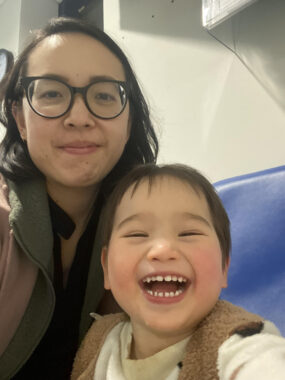The guessing game involved in caring for a nonverbal child
It's often challenging to determine how my son with Angelman feels
Written by |

My 2-year-old son, Jude, lives with Angelman syndrome and is nonverbal, so I’ve had to become more attuned to the subtle ways he communicates his thoughts and feelings.
Sometimes he clearly expresses how he’s feeling, such as by laughing while playing peekaboo, spinning in a sensory swing, or (gasp) listening to farts. Other times, I’ll suspect he’s feeling a certain way based on his behavioral patterns. For example, Jude doesn’t need to say a word for me to know he’s not excited about physiotherapy, because he’ll pout in the waiting room, a quiet protest in anticipation of hard work.
But there are times when I don’t know how Jude feels or why he’s behaving a certain way. I won’t have an explanation for his prolonged, unusual sleep patterns, distress, or low appetite. It becomes a guessing game: How has he been sleeping? Is he unwell?
Recently, the guessing game had real consequences. A few months ago, Jude stopped crawling. He wasn’t crying or visibly in pain; in fact, he was his usual happy self. It took us two weeks to realize that he’d fractured both bones in his right forearm and needed a cast. We felt deeply guilty. How could we not have known?

Joelene Wand and her son, Jude, visit the emergency room well past his bedtime, unsuccessfully trying to convince hospital staff that he’d injured his arm. (Photo by Joelene Wand)
During this period, Jude had also started taking seizure medication, which brought side effects like tiredness, nausea, and headaches that he couldn’t describe. Then came unexplained constipation, despite a balanced diet, which we worried could increase his seizure activity.
Each of these moments required us to become detectives, closely observing changes in mood, energy, and movement. We second-guessed ourselves: Was Jude just tired, or was it something more? Were we worrying too much, or not enough?
It’s a strange tension, trusting your instincts without any medical training while never being sure if you’re reading the signs correctly.
These are just some examples of how challenging it can be to care for someone who can’t tell you they’re unwell. When we learned Jude would likely be nonverbal, our hearts ached at the thought that we might never hear him say “Mom,” “Dad,” or “I love you.” But that grief now pales in comparison with the weight of knowing he can’t yet communicate words like “help” or “hurt.”
Finding the right tools
What has helped me in the aftermath of these experiences is reframing how I see communication. While Jude may not speak, he still has a voice and understands more than he’s given credit for. If he can’t verbally advocate for himself, then part of my job is to give him the tools to do so in any way he can.
I was particularly encouraged by a fellow Angelman parent who shared how her child, in distress, was able to communicate the words “hospital doctor arm cast” on her augmentative and alternative communication (AAC) device after breaking her arm. Since Jude’s cast was removed, I’ve been using Jude’s AAC device to teach him about his body during our everyday routines, such as brushing his teeth, putting socks on his feet, and washing his hands.
Jude can’t identify his body parts yet, but I hope he will one day understand that his body belongs to him, and that it matters if he’s unwell or in pain.
Note: Angelman Syndrome News is strictly a news and information website about the disease. It does not provide medical advice, diagnosis, or treatment. This content is not intended to be a substitute for professional medical advice, diagnosis, or treatment. Always seek the advice of your physician or other qualified health provider with any questions you may have regarding a medical condition. Never disregard professional medical advice or delay in seeking it because of something you have read on this website. The opinions expressed in this column are not those of Angelman Syndrome News or its parent company, Bionews, and are intended to spark discussion about issues pertaining to Angelman syndrome.





Sabrina Johnson
Joelene--you are planting such a great seed here. AAC is so important for those with Angelman Syndrome. Our 15-year-old Angel, Juliana, just had an emergency visit, and it was her talker that saved the day when she identified her pain source. I do not doubt that Jude will eventually be able to do the same. The practice that you are doing will go a long way. The guilt of not knowing is tough, but I try to celebrate the wins when we do get it right.
Dakshit paul
Anjelman syndrom treatment